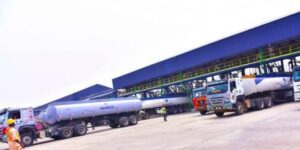

NDDC, Shell complete construction of Ogbia-Nembe road
The Niger Delta Development Commission (NDDC) and the Shell Petroleum Development Company (SPDC) have completed the construction of the 25.7-kilometre Ogbia-Nembe Road in Bayelsa State.
The road project is slated to be commissioned on Saturday, May 25, 2024.
Speaking during a joint inspection of the project by officials of the two organisations, the NDDC Managing Director, Dr Samuel Ogbuku, described the multi-billion-naira project as a legacy and flag-ship of intervention in the Niger Delta region.
Ogbuku said that the “star project,” with seven bridges, 53 culverts and 4 spurs, linking 14 communities, was a good example of what could be achieved through collaboration of development agencies.
He declared, “The Ogbia-Nembe road as a model in partnership, with emphasis on quality job delivery. We have redefined our standards to globally acceptable best practice and we will henceforth compel our contractors to abide by them.”
The NDDC boss said that the NDDC would be banking on multinational corporations such as Shell, Chevron, and others to collaborate with the Commission in executing legacy projects, noting, “The oil giants have what it takes to provide funding, technical assistance, and expertise in environmental management, community development and corporate social responsibility.”
“The SPDC has shown that in addition to its statutory obligation to contribute to the funding of the NDDC, it is also necessary to work with the Commission on specific impactful projects. I am sure that other International Oil Companies, IOCs, will feel challenged to toe the line of Shell to provide quality infrastructure for the people of the Niger Delta.”
Ogbuku said that NDDC was already in discussion with Chevron on forging a partnership for the construction of the Warri-Omadino-Escravos Road, in Warri North Local Government Area of Delta State.
He observed that the project, when completed, would link Warri to Escravos which is the hub of oil and gas activities in Warri, which was very important to the economy of Delta State and Nigeria at large.
The SPDC Corporate Relations Manager, West, Chief Ucheoma Amechi, said that as a company that attaches importance to quality job delivery in the execution of development projects, Shell was satisfied with what has been achieved at the Ogbia-Nembe Road. He gave kudos to the NDDC for doing a good job in the execution of the signature project.
The NDDC Director, Environmental Protection and Control, Engr Onuoha Obeka noted that the road, which cut through swampy terrain, encountered many challenges.
He observed, “We are happy that in spite of the challenges, the project connecting about 14 communities in the Ogbia-Nembe axis of Bayelsa State, has been completed. These communities were hitherto, not accessible by road. This is the first connection between them and the upland and it will boost the socio-economic fortunes of the people.”
Obeka said that the project was an opportunity for the NDDC engineering crew to improve their skills.
He noted, “The challenges we met here were unique, building a road in the mangrove swamp. You will notice that both sides of the road are filled with water. The road was actually built on a sand embankment of 2.5 million cubic metres of sand.”
He explained: “The road traverses the communities of Opume, Emekalakala, Akipelai, Sabatoru, Obiama, Etiama, Igbeta-Ewoama, Agbakabiriyai, Ekese, Iwokiri, Otatubo, Basambiri and Nembe, the project comprises seven bridges and 53 culverts. It also comprises a main alignment of 19.7 kilometres, Opume spur of 1.45 kilometres, Emakalakala spur of 2.685 kilometres, Akipelai spur of 850 metres and Ogbolomabiri spur of 1.05 kilometres.
The Area Manager for SETRACO, Engr. Joseph Cosme, assured the joint inspection team that the Commission had completed all the minor repairs on the road in preparation for the commissioning ceremony.



